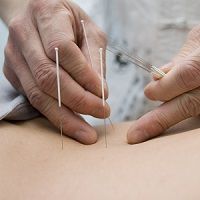Article
New Trial Tests Acupuncture as a Viable Irritable Bowel Syndrome Treatment
Author(s):
Previous trials using acupuncture in patients with irritable bowel syndrome have suffered from problems of high placebo response rates.

Investigators have found promising initial outcomes when using 2 different types of acupuncture to treat patients with irritable bowel syndrome (IBS).
A team, led by Ling-Yu Qi, MM, International Acupuncture and Moxibustion Innovation Institute, School of Acupuncture-Moxibustion and Tuina, Beijing University of Chinese Medicine, tested the feasibility of evaluating the efficacy of acupuncture to treat patients with IBS.
Problems With Past Studies
One of the issues with research regarding acupuncture for IBS is the use of objective scales as an assessment, which yields high placebo response rates.
“Recent evidence suggested that future randomized clinical trials should adhere to current US Food and Drug Administration (FDA)–recommended composite end points for IBS, which leads to lower placebo response rates,” the authors wrote. “Therefore, the first aim of the current study was to preliminarily test the feasibility of using FDA-recommended end points to evaluate the efficacy of acupuncture treatment for IBS.”
The Theory
However, there is a potential biological mechanism involved in acupuncture that could be beneficial for patients with IBS, including reducing visceral hypersensitivity and modulation of the gut-brain axis.
In the pilot, multicenter, randomized clinical trial, the investigators tested acupuncture at 4 tertiary hospitals in China between July 1, 2020 and March 31, 2021. Each participant was treated with either specific acupoints acupuncture (SA), nonspecific acupoints acupuncture (NSA), or a sham acupuncture (NA).
Patients in all 3 groups received 12 30-minute sessions over 4 consecutive weeks at 3 sessions per week.
The investigators sought primary outcomes of the response rate at week 4, defined as the proportion of patients whose abdominal pain score decreased by at least 30% and the number of type 6 or 7 stool days decreased by 50% or greater.
Overall, there were 90 patients included in the pilot study with a mean age of 34.5 years.
Response Rates
The results show substantial improvements in the primary outcomes for all 3 groups (composite response rates of 46.7%; 95% CI, 28.8%-65.4% in the SA group, 46.7%; 95% CI, 28.8%-65.4% in the NSA group, and 26.7%; 95% CI, 13.0%-46.2% in the NA group). However, the difference was not statistically significant (P = .18), but the response rates of adequate relief at week 4 were 64.3% (95% CI, 44.1%-80.7%) in the SA group, 62.1% (95% CI, 42.4%-78.7%) in the NSA group, and 55.2% (95% CI, 36.0%-73.0%) in the NA group (P = .76).
For safety, adverse events were reported in 6.7% (n = 2) of the SA group and 10% (n = 3) of the NSA or NA group.
“In this pilot randomized clinical trial, acupuncture in both the SA and NSA groups showed clinically meaningful improvement in IBS-D symptoms, although there were no significant differences among the 3 groups,” the authors wrote. “These findings suggest that acupuncture is feasible and safe; a larger, sufficiently powered trial is needed to accurately assess efficacy.”
The study, “Acupuncture for the Treatment of Diarrhea-Predominant Irritable Bowel Syndrome,” was published online in JAMA Network Open.




